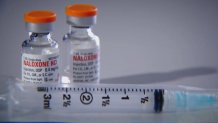A disturbing 636 percent increase in overdoses from the medical-grade opioid fentanyl in Philadelphia has city health officials warning medical professionals and the public about the increased pervasiveness of the dangerously strong drug.
City health officials said Friday that 184 people died last year as a result of a fentanyl overdose, whether by using the drug alone or in combination with another, like heroin. Two years prior, in 2013, the drug killed 25 people. The change equates to a seven fold increase.[[390744721, C]]
"Clearly, we have an epidemic,” Philadelphia’s Health Commissioner Dr. Thomas Farley said at a news conference in City Hall.
This year’s data shows there’s no expectation the epidemic will slow down. In the first four months of 2016, 99 of the overdose deaths involved fentanyl, city data shows.
Fentanyl is a synthetic opioid in the same family as heroin, oxycontin and morphine. But it is 50 to 100 times stronger than morphine. A small dose can prove fatal by causing a person to stop breathing. Often the drug is used to cut another, like heroin, for a stronger high. Sometimes, it’s sold by itself.
“People are buying this drug in the same way as others,” Farley said.

Those suffering from opioid drug addiction quickly grow tolerant to the highs prescription painkillers and heroin provide. The result forces them into increasingly painful withdrawal. So they seek stronger highs, putting themselves at further risk with each hit and each new drug they try.
Heroin users explained the vicious cycle to NBC10 earlier this year as part of our special investigation Generation Addicted. The project, which debuted in March, explored the tragic world of opioid addiction in Philadelphia and beyond. It also looked at its effects on the addicted, their families and society.
Drug overdoses continue to rise despite frantic efforts by local, state and federal health and law enforcement officials to stem a tidal wave of deaths nationwide. More people died of a drug overdose than in a car wreck for the past three years, according to the Centers for Disease Control and Prevention. Opioid overdose deaths accounted for more than 28,000 of the lives claimed in 2014 — the highest on record.
A recently released Drug Enforcement Administration report showed similar trends involving fentanyl across Pennsylvania. Agents saw a 93 percent jump in deaths involving the drug from 2014 to 2015. Further troubling is the fact that “fentanyl was the most commonly reported drug” among people who overdosed from heroin, the agency wrote.

The overdose reversal medicine naloxone — commonly known as Narcan — has helped to bring countless people back to life, but doses may not be large enough to overcome fentanyl’s effects.
U.S. & World
Stories that affect your life across the U.S. and around the world.
Deputy Fire Commissioner Jeremiah Laster said while naloxone typically will coax a person back to consciousness and allow them to breathe on their own following a heroin overdose, the same isn’t true for fentanyl. Medics often try to keep a person’s airway open as they rush them to the closest emergency room, he said.
“The goal is to get somebody to the hospital to get them help,” he said.
Laster, who oversees emergency medical services, said the department is conducting a time-consuming review of patient records to determine whether an increase in naloxone dosage could make a difference in reversing fentanyl overdoses.
Increased dosage will undoubtedly result in higher costs — an issue that’s already becoming a problem for the city and other naloxone providers. Three years ago, the city paid $13.74 for a dose of the medicine. Today, that same dose costs $37.52. Laster said that’s still at a deep discount since the city gets government pricing. Some providers pay upwards of $100 a dose.

Everyone sees the medicine as a stopgap, preventing a person from ending up at the morgue. “Prevention is key to solving this problem,” Laster said.
Dr. Arthur Evans, Philadelphia’s behavioral health commissioner, said the city is taking a number of steps to address the crisis.
Evans said the city is “significantly expanding” access to services and medicine-assisted treatment. These medicine therapies help stabilize a person as they work to wean themselves off of drugs over a long-period of time.
The city is adding 500 extra slots for methadone treatment, 500 additional detox opportunities and doubling access to buprenorphine, widely known as Suboxone, to offer people help when they are asking for it, Evans said.
Behavioral health staff are doing outreach in communities with the highest concentrations of drug addicted people, like hard-hit Kensington, to let people how they can get help.
An assessment center at the North Philadelphia Health System (801 W. Girard Ave.) operates 24 hours a day helping to connect people to treatment offerings. A phone hotline (888-545-2600) does the same, Evans said.
Three state-sponsored Centers for Excellence will begin offering expanded treatment for Medicaid patients starting in the fall. Evans is hoping new money appropriated through the recently-passed federal Comprehensive Addiction and Recovery Act will makes it way to the city through grants.
Outreach is also taking place among the medical community. For years, doctors freely prescribed prescription opioids, in the form of pills like Oxycontin, Percocet and Vicodin, and benzodiazepines like Xanax contributing to the epidemic’s wide scope. Now officials are trying to help physicians balance managing a patient’s pain and preventing addition from taking hold.
The Pennsylvania Medical Society and Pa. Gov. Tom Wolf’s administration issued new prescribing guidelines in July issuing a number of recommendations to doctors including putting a limit of seven days on opioid prescriptions doled out in the emergency room.
Addiction experts say many times patients are given too many pills to treat a minor issue leaving the door open for dependence or abuse by another person in their home.
Farley couldn’t say whether the city’s emergency rooms were following the guidelines (they are not required), but said his office plans to conduct outreach with doctors to keep them abreast of the epidemic.
And as the city works to address this latest facet of the complex crisis, there are new concerns from law enforcement about even stronger opioids hitting Philly’s streets.
Narcotics officers and DEA agents believe the synthetic opioid W-18 has begun to seep into the the local drug market. Designed in China, the drug can be up to 10,000 times stronger than morphine. Large amounts of the drug were seized in Miami and Alberta, Canada. Police drug labs have begun testing for it.
But as addiction specialist Dr. Brian Work told NBC10 earlier this year, with the heroin and fentanyl problem as pervasive as it is, “it's hard worrying about the next thing down the pipe."
Wednesday, August 31 is International Overdose Awareness Day. NBC10 will be re-airing our 30 minute documentary from Generation Addicted at 7 p.m. that night.



